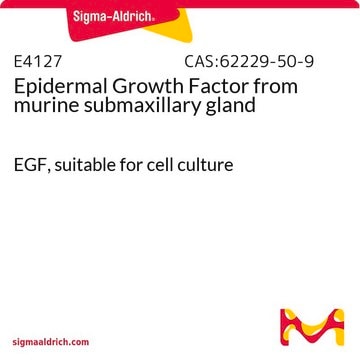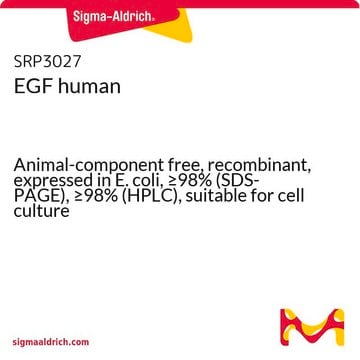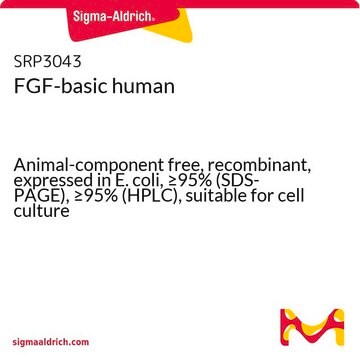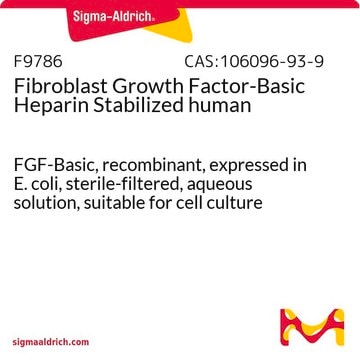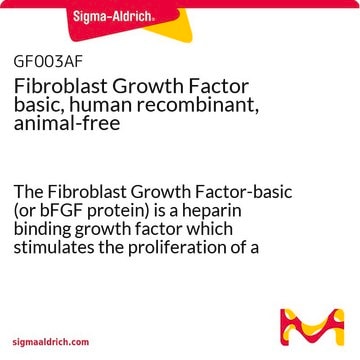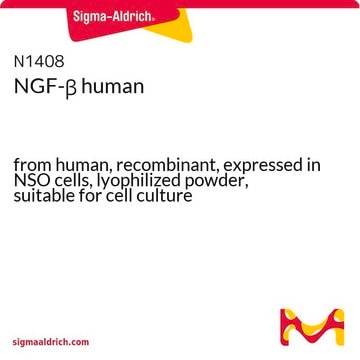SRP6159
FGF-basic human
recombinant, expressed in human cells, ≥95% (SDS-PAGE)
Synonym(s):
FGF-2, FGF-b, HBGF-2, HBGH-2, Prostatropin
Sign Into View Organizational & Contract Pricing
All Photos(1)
About This Item
Recommended Products
biological source
human
recombinant
expressed in human cells
Assay
≥95% (SDS-PAGE)
form
lyophilized
mol wt
17 kDa (monomer, non-glycosylated)
packaging
pkg of 10 μg
technique(s)
cell culture | mammalian: suitable
NCBI accession no.
UniProt accession no.
shipped in
dry ice
storage temp.
−70°C
Gene Information
human ... FGF2(2247)
General description
FGF-basic is a member of the fibroblast growth factor (FGF) family. Three alternatively spliced variants encoding different isoforms have been described. The heparin-binding growth factors are angiogenic agents in vivo and are potent mitogens for a variety of cell types in vitro. There are differences in the tissue distribution and concentration of these 2 growth factors. The gene encoding this protein is localized on human chromosome 4q28.
Biochem/physiol Actions
FGF family members possess broad mitogenic and cell survival activities, and are involved in a variety of biological processes, including embryonic development, cell growth, morphogenesis, tissue repair, tumor growth and invasion. This protein functions as a modifier of endothelial cell migration and proliferation, as well as an angiogenic factor. It acts as a mitogen for a variety of mesoderm- and neuroectoderm-derived cells in vitro, thus is thought to be involved in organogenesis. The protein associates with fibroblast growth factor receptors 1, 2 and 3 (FGFR-1, -2, -3).
Physical form
Lyophilized from a PBS solution.
Preparation Note
Centrifuge the vial prior to opening.
Reconstitution
Reconstitute in sterile PBS containing 0.1% endotoxin-free, recombinant human serum albumin.
Storage Class Code
11 - Combustible Solids
WGK
WGK 3
Flash Point(F)
Not applicable
Flash Point(C)
Not applicable
Certificates of Analysis (COA)
Search for Certificates of Analysis (COA) by entering the products Lot/Batch Number. Lot and Batch Numbers can be found on a product’s label following the words ‘Lot’ or ‘Batch’.
Already Own This Product?
Find documentation for the products that you have recently purchased in the Document Library.
Customers Also Viewed
Yuriko Katoh et al.
International journal of molecular medicine, 17(3), 529-532 (2006-02-09)
WNT, FGF and Hedgehog signaling pathways network together during embryogenesis, tissue regeneration, and carcinogenesis. FGF16, FGF18, and FGF20 genes are targets of WNT-mediated TCF/LEF-beta-catenin-BCL9/BCL9L-PYGO transcriptional complex. SPROUTY (SPRY) and SPRED family genes encode inhibitors for receptor tyrosine kinase signaling cascades
Cigdem Usul Afsar et al.
International journal of clinical and experimental pathology, 8(9), 9760-9771 (2015-12-01)
Non-small cell lung carcinoma is the leading cause of cancer related to death in the world. Squamous cell lung carcinoma (SqCLC) is the second most frequent histological subtype of lung carcinomas. Recently, growth factors, growth factor receptors, and signal transduction
Arsenii Zabirnyk et al.
Frontiers in pharmacology, 11, 568764-568764 (2021-01-05)
Background: No pharmacological treatment exists to prevent or stop the calcification process of aortic valves causing aortic stenosis. The aim of this study was to develop a robust model of induced calcification in whole aortic valve leaflets which could be
Mingming Hu et al.
PloS one, 11(1), e0147374-e0147374 (2016-01-30)
Basic fibroblast growth factor (bFGF) is known to stimulate angiogenesis and thus to influence the proliferation, migration and survival of tumor cells. Many studies examined the relationship between human bFGF overexpression and survival in lung cancer patients, but the results
Abha Sahni et al.
Blood, 104(12), 3635-3641 (2004-08-07)
We have shown previously that fibrin(ogen) binding potentiates the capacity of fibroblast growth factor 2 (FGF-2) to stimulate endothelial cell (EC) proliferation. We have now investigated the receptor requirement for EC proliferation by fibrinogen-bound FGF-2. ECs were cultured with 25
Our team of scientists has experience in all areas of research including Life Science, Material Science, Chemical Synthesis, Chromatography, Analytical and many others.
Contact Technical Service

